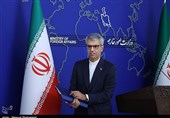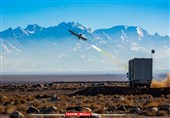Israel Not to Cooperate with UN Probe of Gaza Killings: UN Rights Expert
TEHRAN (Tasnim) – A UN rights expert said Israel will not cooperate with an investigation ordered by the UN Human Rights Council into the killings of Palestinians by Israeli troops in Gaza last week.
“The inquiry is directed to examine whether war crimes have been committed, to determine responsibility and accountability, and to make recommendations with an eye to avoiding and ending impunity. The inquiry is directed to deliver its final report to the Council next March,” Michael Lynk, the UN Special Rapporteur on situation of human rights in the Palestinian territory, said in an interview with the Tasnim News Agency.
He added, “Israel did not co-operate with the previous two inquiries established by the HRC – to investigate the 2008-09 and 2014 wars in Gaza -- and there does not appear to be any positive early signs that Israel will offer to work with this inquiry either.”
Michael Lynk is Associate Professor at the Faculty of Law, Western University, in London, Ontario. He joined the Faculty in 1999, and has taught courses in labour, human rights, disability, constitutional and administrative law. He served as Associate Dean of the Faculty between 2008-11.
The following is the full text of the interview.
Tasnim: Israeli forces killed at least 62 Palestinians during protests near the Gaza fence on the eve of the 70th anniversary of the Nakba Day (the Day of Catastrophe). What is your take on this?
Lynk: The mass killings and wounding of protestors from Gaza, beginning on 30 March and continuing through April and May – most of whom appear to have been either unarmed, or otherwise presenting no probable threat to the lives or well-being of the Israeli military – appears to be a blatantly excessive use of force by the Israeli military. International human rights law sets strict prohibitions on the use of force by security officers, the military and law enforcement officials. Lethal force against demonstrators is forbidden unless strictly unavoidable as a last resort in the case of an imminent threat to life or threat of serious injury to the armed officer. Given the lack of any causalities by the Israeli military forces, because they were well-protected and out of range of any harmful object that any of the demonstrators possessed – one soldier was reported to have been slightly wounded throughout the seven weeks of the protests – it would appear to be a steep argument to make that the use of lethal force in these circumstances was justified.
Tasnim: You were quoted by media as saying that “Israel's use of force may amount to a war crime.” Please explain on this.
Lynk: The modern definition of war crimes is found in the 1998 Rome Statute. Among the acts which could constitute a war crime are: (i) “Willful killing”; and (ii) “Willfully causing great suffering, or serious injury to body or health”. These are also grave breaches under Article 147 of the Fourth Geneva Convention. I note that the Chief Prosecutor of the International Criminal Court cautioned Israel and Hamas in April that: “Violence against civilians – in a situation such as the one prevailing in Gaza – could constitute crimes under the Rome Statute of the International Criminal Court, as could the use of civilians for the purpose of shielding military activities.” I also note, with alarm, that the IDF posted the following message on its Twitter feed following the first series of killings on 30 March: “Nothing was carried out uncontrolled; everything was accurate and measured, and we know where every bullet landed.”
Tasnim: the 70th anniversary of the Nakba Day coincided this year with Washington’s embassy relocation. The US Ambassador to the UN has said “no country would act with greater restraint than Israel”, as the death toll of Palestinians killed by Israeli troops passed 60 and officials said 2,700 had been wounded. What do you think about this?
Lynk: With great respect to the American ambassador, it is beyond my moral imagination to understand how the killing of 60+ demonstrators – most of whom were unarmed – and the wounding of several thousand more represents restraint in these circumstances. No dictionary that I possess appears to encompass such a mass killing within its definition of “restraint”.
Tasnim: As you know, the UN human rights body has called for an independent investigation into the recent Israeli massacre of Palestinian protesters in the Gaza Strip after the US blocked the same bid at the Security Council. “We call for independent, transparent investigations in all cases of death and injury since 30 March. Since 30 March, 112 Palestinians, including 14 children, have lost their lives at the fence and thousands have been injured,” Rupert Colville, the spokesman for the Office of the High Commissioner for Human Rights, said. When will the probe start? How much respect do you think Israel has for international human rights organizations?
Lynk: The United Nations Human Rights Council voted on Friday, 18 May, to create an independent, international commission of inquiry to examine the events of the past two months in Gaza and the rest of the oPt (occupied Palestinian territories), in the context of international humanitarian and human rights law. The inquiry is directed to examine whether war crimes have been committed, to determine responsibility and accountability, and to make recommendations with an eye to avoiding and ending impunity. The inquiry is directed to deliver its final report to the Council next March.
Israel did not co-operate with the previous two inquiries established by the HRC – to investigate the 2008-09 and 2014 wars in Gaza -- and there does not appear to be any positive early signs that Israel will offer to work with this inquiry either.






